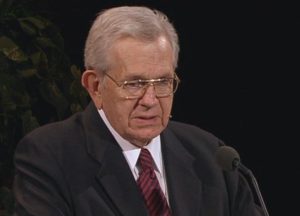
In one of my earliest encounters with the world of the bloggers and podcasters who are critical of the Church of Jesus Christ of Latter-day Saints, I heard about a quote from Boyd K. Packer, former president of the Quorum of the Twelve Apostles. I’m going to paraphrase now because I don’t remember how the quote was originally related to me. I remember it being something like “the three greatest enemies of the church are feminism, intellectualism and homosexuality”. I felt the the purpose of recounting this particular quote was to show what an uninspired, bigoted and hateful man this LDS leader really was.
Honestly, at the time I was on overload, having received too much critical information at once to process it all. I guess I excused it as Elder Packer being a product of his time. I’m getting older—having been born in 1961—and have seen some pretty dramatic shifts in attitudes and perceptions. I am keenly aware that those who lived through World War II and the great depression see the world in a way that I can only begin to understand. I am also strongly of the belief that all people, including prophets and apostles are imperfect and may act and think in ways that are contrary to the will of God. For these reasons I didn’t give a great deal of thought to this quote and focused my attention on other issues.
Then several Sundays ago—for reasons I’m not aware of—I really wanted to know what Elder Packer said and if there were contextual clues that might add to his meaning. So I googled the gist of what I could remember of the quote. The first thing that came up –as is often the case- was a page critical of the church. This particular one was devoted to painting Boyd K. Packer in the worst possible light. I hate to admit this, for fear of having my punctuation skills judged, but I have a degree in English teaching. I love words and I’m fascinated by rhetoric. I couldn’t help but notice the general structure of the page. In nearly every instance the writers—nearly all of whom choose to remain anonymous—set up the Packer quote to prepare you to be offended or followed up the quote with commentary to insure that you were. The entire page seemed to me to have a nasty, mocking tone. It did however provide me with the quote I was looking for. I cut this directly from that page:
Boyd K. Packer is a man for whom truth is utterly expendable and who cares more about the results (creating belief no matter what) than about integrity. He clearly believes that honesty is not a necessary part of the due process of obtaining one’s belief.
Boyd K. Packer also stated that the three greatest threats to the church were homosexuals, feminists and intellectuals. “The dangers I speak of come from the gay-lesbian movement, the feminist movement (both of which are relatively new), and the ever-present challenge from the so-called scholars or intellectuals.” (Talk to the All-Church Coordinating Council, May 18, 1993)
It’s subtle but interesting to notice that the author uses his own words to suggest that Packer is attacking the people themselves, the homosexuals or feminists. Packer’s actual words speak of the movements and the challenges. Without additional context it appears that there is really no difference. Fortunately, the one line that is quoted exactly and the date and place made it easy to find the whole talk. This was helpful because since this address was aimed at a particular audience and not the whole church, it isn’t available on LDS.org. You can find it here and here. I’m about to give you my interpretation of what was said, but I encourage you to study the whole thing for yourself and come to your own conclusions.

Elder Packer, having been appointed as the new supervisor of Seminaries and Institutes, recalls going to visit Harold B. Lee, who was then president of the Quorum of the Twelve. President Lee gave him some advice that apparently impacted not only his approach to his new job, but also the rest of his life. This was 1955 and the advice, “You must decide now which way you face,” seems even more essential today.
Specifically, Elder Lee was asking him to consider his primary responsibility in his new position. Was it to represent the students and teachers and promote their ideas and concerns to the brethren, or was it to be a representative of the church leaders? Stop for a moment because I can almost feel the indignation and objections that some readers may have at this point. Let’s save a discussion of blind obedience to leaders for another day. Consider that this particular talk was aimed at the all-church coordinating council, the group whose mission is to mold the various departments, programs and organizations of a diverse world-wide church into one smoothly-running united whole. I just added church correlation to my list of future topics, and let’s just suffice it to say that Elder Lee is reminding Brother Packer that the organization of the church, not unlike many governments or corporations, is essentially from the top down. Elder Packer then relates several instances in which he is either took correction from someone above him in the organization or made his own corrections by questioning himself as to which way he faced.
While on the surface Elder Lee’s council is about running an efficient organization, the real meaning and vital lessons learned by heeding it are more profound. President Packer actually started the talk by stating that he had based it on a scripture in Alma “God gave unto them commandments, after [first] having made known unto them the plan of redemption.” (Alma 12:32). I know that not everyone who will read this believes in a Higher Power, but the message is for those who do. It is that it is not our job to tell God who He should be, but rather to search for who God wants us to be.
You see, life isn’t fair. Babies are born with defects or not born at all. We are subject to life-changing or life-ending accidents and diseases. Wars, prejudice, abuse, and hatred surround us. The list of injustices could go on and on. The gospel teaches that the way to find peace and understanding is to face God and know that through the plan of redemption all things will be made right in the eternities.
Now we get to the part you’ve all been waiting for, Elder Packer’s inflammatory remarks. He said—or in my mind prophesied, since it was 24 years ago—that there were three big issues that would turn people away from God and the church. Here is the quote:
It is so easy to be turned about without realizing that it has happened to us. There are three areas where members of the Church, influenced by social and political unrest, are being caught up and led away. I chose these three because they have made major invasions into the membership of the Church. In each, the temptation is for us to turn about and face the wrong way, and it is hard to resist, for doing it seems so reasonable and right.
The dangers I speak of come from the gay-lesbian movement, the feminist movement (both of which are relatively new), and the ever-present challenge from the so-called scholars or intellectuals. Our local leaders must deal with all three of them with ever-increasing frequency. In each case, the members who are hurting have the conviction that the Church somehow is doing something wrong to members or that the Church is not doing enough for them.
I believe that the point he is making is that these issues would be especially difficult for members to reconcile because our sense of fairness would be affronted. Go back; read the quote again. I think you will see that he isn’t insulting any groups of people but trying to explain how difficult it may be to continue to face toward God when things get really murky.
 Elder Packer then goes on to speak about the many letters written by members who are hurting or leaders who are worried concerning these topics. I want you to read his actual words carefully.
Elder Packer then goes on to speak about the many letters written by members who are hurting or leaders who are worried concerning these topics. I want you to read his actual words carefully.
Those who are hurting think they are not understood. They are looking for a champion, an advocate, someone with office and influence from whom they can receive comfort. They ask us to speak about their troubles in general conference, to put something in the curriculum, or to provide a special program to support them in their problems or with their activism.
When members are hurting, it is so easy to convince ourselves that we are justified, even duty bound, to use the influence of our appointment or our calling to somehow represent them. We then become their advocates — sympathize with their complaints against the Church, and perhaps even soften the commandments to comfort them. Unwittingly we may turn about and face the wrong way. Then the channels of revelation are reversed.
Elder Packer goes on to say that there is absolutely no doubt that people facing these concerns need support and comfort, which should ideally come on a personal level from local leaders and members. The answer to the complex questions of how this is best done, he says, should start with the plan of redemption.
Those fifteen words from Alma state: “God gave unto them commandments, after having made known to them the plan of redemption.” There are many things that cannot be understood nor taught nor explained unless it is in terms of the plan of redemption. The three areas that I mentioned are among them. Unless they understand the basic plan — the premortal existence, the purposes of life, the fall, the atonement, the resurrection — unless they understand that, the unmarried, the abused, the handicapped, the abandoned, the addicted, the disappointed, those with gender disorientation, or the intellectuals will find no enduring comfort. They can’t think life is fair unless they know the plan of redemption.
I know that not everyone is going to agree with Elder Packer and his views, but I chose to use several rather long quotes because I don’t believe that it is fair to take 29 words out of a talk of 3170 (as counted by Microsoft Word) and label the man a fascist or worse. I love that I started with what seemed to be a hate filled-quote, and ended with a clearer view of the gospel plan and a challenge to care for those who are struggling without losing a focus on the Savior.
Note: I don’t claim to be an expert, just an ordinary member trying to sort through complex issues. If I have missed something or gotten it wrong, I would really appreciate your feedback. My goal is to be part of a civil conversation that helps me learn and promotes understanding. With this in mind, I would love to reach a larger audience. So if you are willing to like or share this post or site on social media, I would be grateful.
Other Note: In 2014 Elder Lynn G. Robbins gave an excellent conference message based on being asked by President Packer which way he faced.
Recent Comments